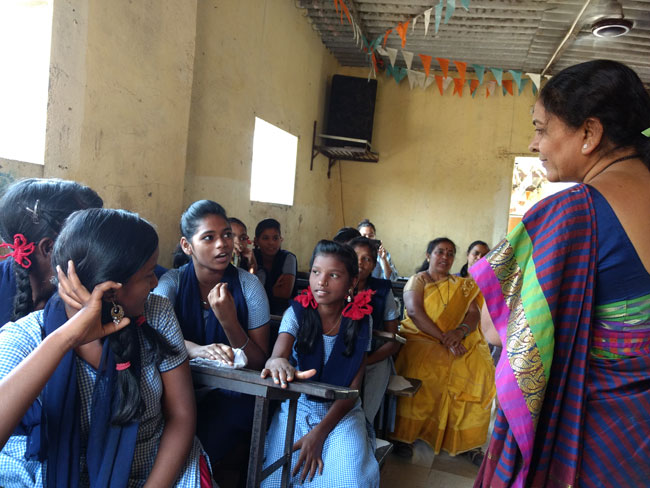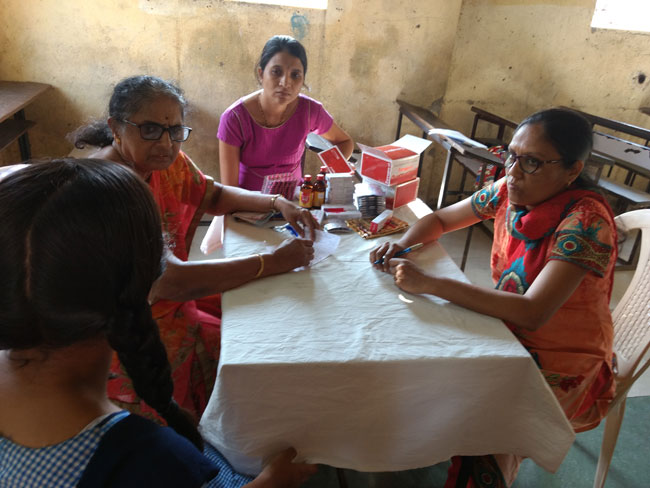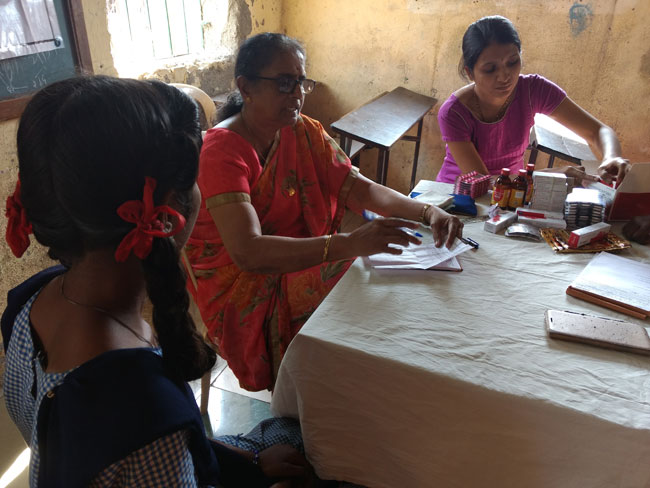Messengers of Hope
The ‘Messengers of Hope’ Programme implemented by the Family Planning Association of India (FPA India) in collaboration with FICCI Ladies Organisation (FLO) was launched on February 4, 2019, in the slums of Manoramanagar, Thane, Maharashtra. It works in the areas of adolescent health, menstrual hygiene, syndromic management of sexually transmitted and reproductive tract infections, contraceptives and referrals for health issues that require special intervention.
Objectives: To contribute towards improved sexual and reproductive health and the well-being of a minimum of 50 adolescent, young girls and women in one location over a period of four months.
Strategy
- Haemoglobin screening.
- Supplementation and follow-up sessions.
- Awareness sessions on nutrition, menstrual health and hygiene management.
- Comprehensive sexuality education (CSE) sessions for adolescent girls.
Activities
| Two health check-up sessions | Assessing haemoglobin levels before and after iron and folic acid supplementation, provision of deworming, antibiotics for infections, other medicines for minor ailments, provision of contraceptives (if applicable). |
| Distribution of sanitary napkins | Three packs of sanitary napkins. |
| Two CSE sessions | Session on menstrual hygiene management, sexual and reproductive health rights, HIV, violence and abuse, etc. |
| Tracking beneficiaries for compliance | Assessment of iron-folic acid (IFA) tablets and contraceptive use |
Outcomes
The Messengers of Hope Programme inauguration was followed by a haemoglobin (HB) testing session for 55 girls (in and out-of-school) and women. In the sessions that followed, the number of beneficiaries increased to 95.
Out of these, 18 have been married and 77 are unmarried. Post the HB testing, two supplementation and follow-up sessions along with home visits were planned. The beneficiaries of these sessions were adolescent girls from the Siddheshwar High School, out-of-school adolescent girls, and women requiring pre-natal care (PNC) and ante-natal care (ANC) in and around Manoramanagar, Thane.
It was observed that most of the adolescent girls belonged to families where parents are construction workers. Hence, their food intake largely comprised of junk food. Many of them skipped having the most important meal of the day, ie, breakfast. This led to them eating unhealthy food like vada pav and Kurkure when they got severe hunger pangs. Commonly observed problems among many of these girls were lethargy, irregular periods and pain during periods, which impacted their academic performance. However, during the follow-up sessions, the adolescent girls were made aware of the importance of eating healthy in order to avoid tiredness and drowsiness. Low-cost, homemade, healthy food and basic exercises were suggested to the girls in order to increase their HB levels, resulting in better health and improved performance. In the follow-up sessions and some of the home visits, the parents and family members of the adolescent girls were advised about the importance of eating breakfast. Many of the adolescent girls from Siddheshwar High School had the habit of eating limestone. This was a clear indication of a lack of calcium in their bodies.
Iron-folic acid and calcium supplements were provided to the girls whose HB levels were low and those who showed signs of calcium deficiency. Surprisingly, 60 girls/women out of 95 had never visited a gynaecologist before in their lives and were unaware of where to access sexual and reproductive healthcare services. Over 23 girls/women were unaware of menstrual health and hygiene before the intervention. The supplementation was regularly taken by 43 women and girls for 15 days, followed by 37 women for 15 to 30 days, and three women/girls for over 30 days.
Besides information on health and hygiene, Comprehensive Sexuality Education (CSE) sessions were also conducted for the in and out-of-school adolescent girls. Topics such as gender equality and rights and opportunities for girls and women were discussed. Active participation was observed from adolescent girls in the open discussion and awareness session on health, hygiene and nutrition. The girls readily discussed their health issues with the doctor during the health check-up sessions.
The ANCs/PNCs were made aware of post-partum contraception. Further, information related to nutrition, regular check-ups and breastfeeding were provided to ANCs and PNCs and nutrition schedules were monitored during the home visits.
Almost all the 95 girls and women who were a part of the intervention said that they felt less lethargic than before.
Key achievements
Haemoglobin levels:
- There were 10 girls/women whose HB levels were below 8mg/ml before the intervention. Post the intervention, the number went down to three girls/women. They have been referred to the Kutumb Niyojan Adarsh Kendra clinic in Thane for further supplementation and treatment.
- The number of women and girls with HB levels between 11mg/ml to 13mg/ml increased from 17 to 30 by the end of the intervention. This was a clear result of supplementation and healthy eating practices being followed regularly at home.
General health:
- About 34 girls/women would frequently fall ill (up to twice a month) before the intervention, which reduced to 24.
- Before the intervention, 30 women/girls complained of pain during periods, which got reduced to just nine.
- An improvement in appetite was seen in 82 girls/women post the intervention.
- With the nutrition supplementation provided during the intervention, the weight of 52 girls/women increased.
Menstrual health and hygiene:
- In the pre-intervention phase, 59 girls/women said that they were using sanitary napkins, whereas six used cloth and seven alternated between cloth and pad. However, by the end of the intervention, about 86 girls/women said that they were comfortable using pads and 89 said they would like to continue using pads.
- Almost 22 girls/women complained of irregular period flow. However, post-intervention, only 15 had issues with irregularity of the flow.
- White discharge was frequently experienced by approximately 10 girls/women earlier, which came down to only four women/girls.
- Close to 17 adolescent girls agreed to have remained absent from school during periods due to pain and discomfort. This number fell to five, after they were asked to practise healthy eating and living.
Awareness:
- Due to the increasing awareness in Manoramanagar through the intervention, some other women and girls were also referred to FPA India for their sexual and reproductive health problems.
- Parents of adolescent girls started taking keen interest in their daughters’ health after home visits by the link worker for increasing awareness.
- About 61 girls wish to continue some form of education in order to be able to be independent women.



